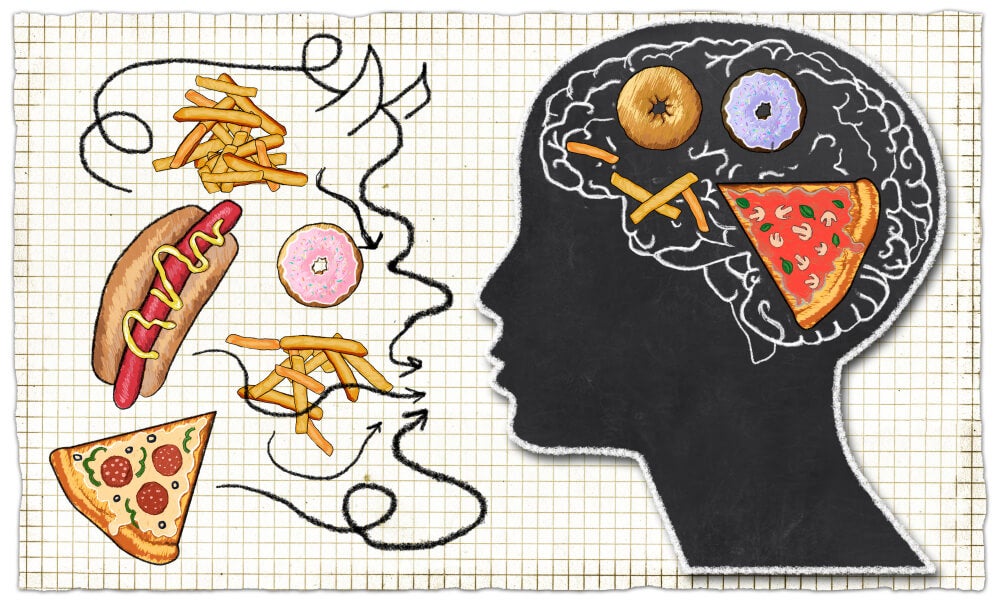Our emotions have a powerful effect on food choice and eating habits. For example, the link between emotion and diet has been found to be stronger in obese and dieting people than in thin, non-dietary people (Sanchez and Pontes 2012). .
Emotions are not the cause of overweight, but how we deal with those emotions and the factors that most influenced the appearance of the overweight.
- What we eat affects how we feel.
- As well as how we feel affects the way we eat.
- In this sense Cooper and other authors (1998) tell us that the difficulty in regulating negative moods has a great influence on the onset and maintenance of food.
- Disorders.
Emotional regulation refers to the management of one’s emotions, taking into account the circumstances and emotional state of others, so it has been observed that shame and guilt are emotions that can have a greater negative impact on the diet. As we can see, the link between emotion and food is more important than we think.
“What we think generates emotions, but what we eat also generates emotions. “Montse Bradford?
People develop different behaviors in response to their emotions based on several factors, such as the environment in which they live, their training and their ability to identify and manage their feelings, so they manage to control their weight or not, for example. , it has been observed that emotions and behaviors affect nutritional decisions, such as quantity, type of food and number of meals. A person with depression can skip meals or skip breakfast in their daily routine. As we can see, the link between emotion and food is a concrete fact.
The emotional factor that most influences sedentary people is the disinhibition of food and the ingestion of certain foods, such as chocolate and sweets; however, in athletes, feelings of guilt, such as fear of flakes and consumption of sweets, influenced emotions more than emotions. disinhibition of food.
Emotional factors in sedentary people are more dysfunctional than in people who perform physical activity. Excessive cravings and lack of control over food intake are more related to overfeeding and food behavior problems.
There is a specific group of individuals who, because of their eating habits, have been called “repressed eaters”. These people are more afraid to gain weight, to restrict their diets. Paradoxically, under these restrictive conditions, these individuals increase their levels. food consumption due to over-consumption.
Abusing the pleasure of eating can make us feel more tired and constantly looking for more food, but it can also cause serious health problems. Our emotion must make us aware of the food we need.
“With food, can we generate health or disease? Montse Bradford?
The greater the prohibition, the greater the risk of binge eating, the standardization of food intake should be a fundamental objective in the treatment of uncontrolled foods, purgative behaviors act as reinforcers and, therefore, promote uncontrolled foods, in addition to bringing important health risks .
Let’s take an example to show that the food ban establishes an obsession with food. If I say the phrase, “There’s a yellow butterfly in the room,” we won’t be able to think of anything other than the yellow butterfly. Be sure to process this information.
That is because the cause is rooted in our unconscious, the unconscious is the part responsible for controlling our body, interpreting and storing the information that our senses receive.
The unconscious works through symbols and images, rather than text or letters. This implies that the unconscious does not process negative terms. If we say, “I shouldn’t eat fries,” the unconscious will only see the picture of fries and therefore we won’t want to eat anymore. This doesn’t mean it always happens, but it greatly increases the chances of that happening.
Good nutrition is of great help to achieve a balance between the body and a healthy mind.
When we use food to calm our emotional state, we feed emotionally; one way or another, anxiety about our weight and body masks deeper concerns, becomes a vicious cycle of unresolved concerns that hinder our ability to grow and develop.
Each organ generates one or more emotions. Depending on the foods we eat, we will experience very different emotions, because each food has different organs. If we eat liver-blocking foods, such as alcohol, such as emotions of anger, irritation, aggression, or impatience.
People with emotional problems often look for foods to feel better, as many of them contain Tryptophan, an amino acid that causes serotonin to release. Low Serotonin levels are associated with depression and obsession.
Lack of Serotonin causes different negative effects on the body, such as anxiety, sadness or irritability, when the body does not produce Tryptophan we do so through diet, so Tryptophan-rich foods act as natural antidepressants.
According to experts, the food group that contributes the most to the regulation of emotions is that of cereals, rich in vitamin B, which directly influences the nervous system, regular consumption of cereals reduces anxiety and positively influences our attitude to problems.
Sometimes we believe that eating will save us from negative emotions, this thought reinforces the link between emotion and food, leading us into a vicious circle.

